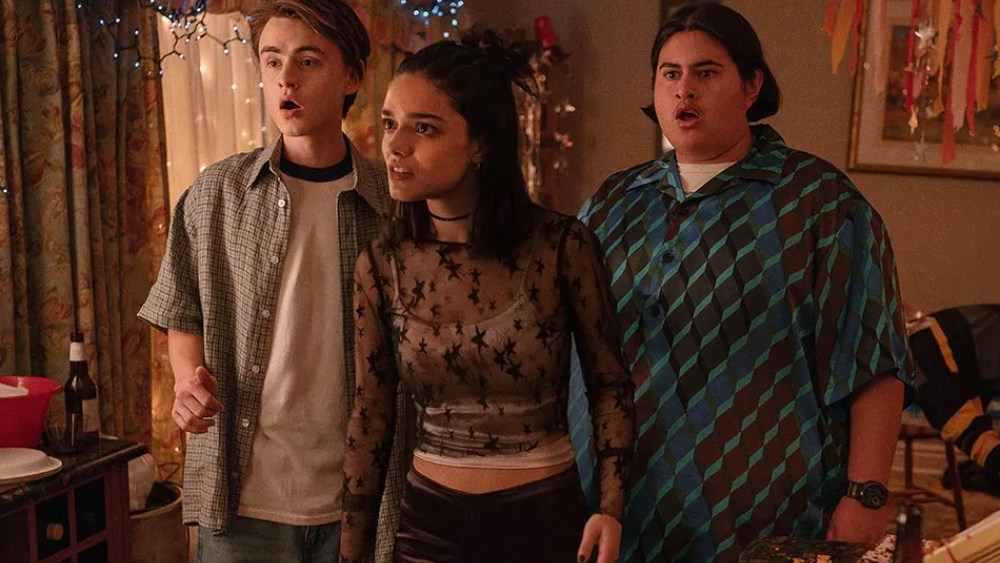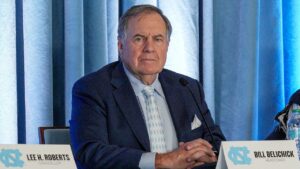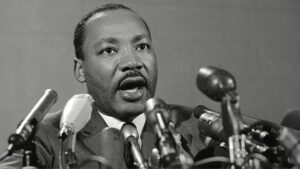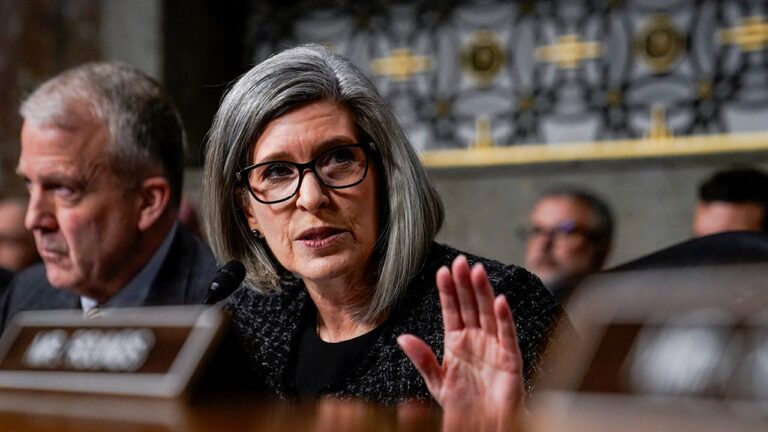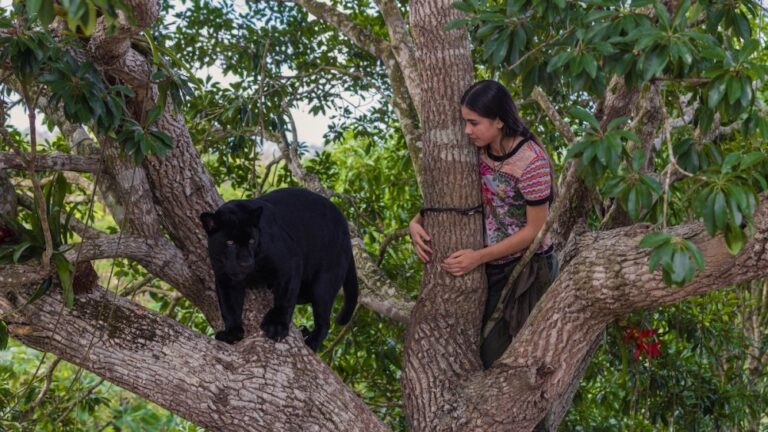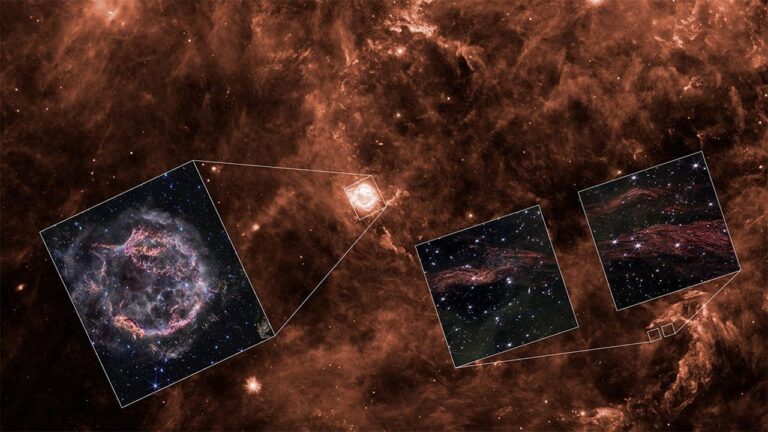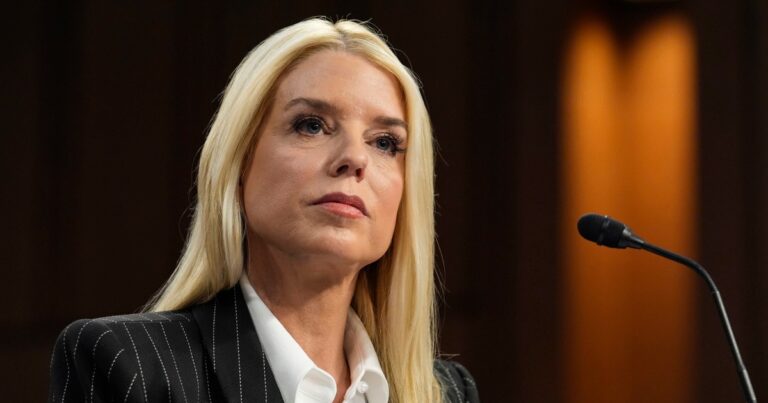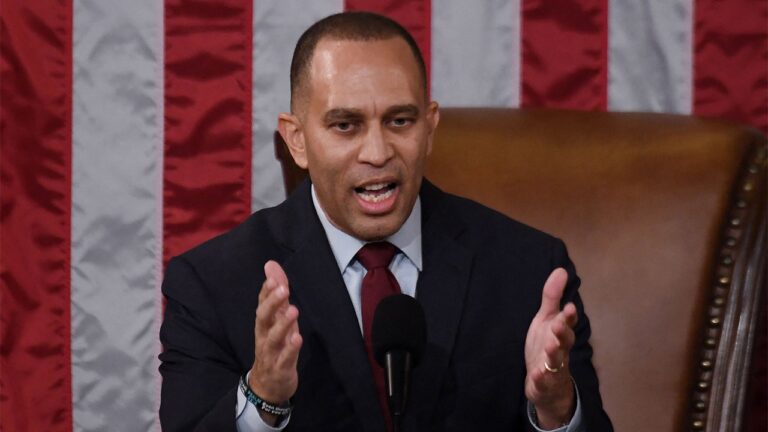SPOILER ALERT: This story contains spoilers for “Y2K,” out now in theaters.
As the clock struck midnight on Jan. 1, 2000, the world held its breath. Would our computers, unequipped for the 21st century, simultaneously crash and usher in widespread chaos?
Thankfully not.
But Kyle Mooney’s raucous directorial debut, “Y2K,” playfully imagines the worst-case scenario from the once-feared night. The A24 horror-comedy, co-written by Mooney (who also stars) and Evan Winter, follows a pair of unpopular teens who crash a New Years Eve party in 1999, only to fight for their lives as the world’s electronics come alive for a murderous (and gory) uprising.
Stars Jaeden Martell and Julian Dennison, both born after the dawn of the new millennium, had to be brought up to speed on some of the more in-the-weeds references to life in the 1990s, like the infamous “Herbal Essences Girl” and Tae-Bo workout tapes. Despite boasting a cast of mostly Gen Z-ers including Rachel Zegler, Lachlan Watson and Daniel Zolghadri, the film gets its depiction of the Y2K era just right — with some help from ’90s icon Fred Durst, who plays himself.
Below, Mooney, Martell and Dennison break down the film’s most outrageous moments for Variety.
Julian, your “Thong Song” performance is one of the highlights of the film. How did you prepare for that, and did you know the song before?
Julian Dennison: No, not at all. Did you guys know it was ‘The Thong Song’ right away?
Kyle Mooney: I think we had another song early on in the script. It sounds corny, but I do think the thing you end up with is ultimately the thing that you were sort of destined to have. And ‘Thong Song’ does feel perfect.
Dennison: I did some little dancing classes, and then just had the song on repeat. They burnt it onto a disc and I had a little CD player. When we were there shooting it, it was great. I felt comfortable to sing it. I was looking at Jaeden, and he was making sure I was OK.
Mooney: You were getting rounds of applause!
Jaeden Martell: I was sometimes off camera, so I didn’t have to be there the whole time. I mean, I didn’t want to hear the song 1,000 times. I was enjoying watching him, but I’d come outside to video village, and everyone’s like, “Oh my god, are you watching this?” And everyone’s singing it on set for weeks. It was a lasting impact.
I was pretty shocked that Danny died so early in the film. Why was that so important to the story?
Mooney: I’m always fascinated and excited by taking extreme turns. I like the idea of an audience member being in the theater having that reaction, like, “Oh man, I didn’t see that coming.” You know, it’s unfortunate Julian made Danny the most lovable character in the universe! But it’s also the catalyst for the rest of the film, and it informs the Eli character and the whole story that unfolds. We were just interested in taking the road less traveled, to some degree.
Martell: It kind of bit you in the ass! Obviously that was your intention to have this likable, lovable character, and then hire Julian Dennison to play that character, and then have him killed and break people’s hearts. But it was honestly too successful, where you’re like, “Damn, I don’t want to watch the rest of the film! I don’t want to be with these people. I want to be with him up in heaven!”
Mooney: Well, Danny pops back in – actually, his spirit. He’s like a force ghost.
Dennison: A few months later, after we shot it, at the end, there’s this post credit scene where you see his force ghost, partying with robot babes. I remember getting that call like, “Man, they just can’t get enough of Danny!”
Mooney: The goal for us is that hopefully you’ll laugh, hopefully you maybe scream or move in your chair because something spooky happened, and, in a perfect world, you shed a tear. If you can get all those things in one piece, that is a full home run.
Fred Durst plays himself in the film. Why was he the right ’90s icon for this movie?
Mooney: I wish I knew the answer to that. Evan, who I wrote it with, pitched him as an idea in the first week of us conceptualizing this idea. Over the course of writing the screenplay, we pitched other ideas: “Who else could this be if we can’t get Fred?” Nobody ever seemed to check all the boxes. For some reason, he is so iconic to the era and probably transcends the era. He’s got the hat, he’s got everything! He’s so representative and evocative of that moment in time that he felt so perfect. Fortunately, he was the first person we went out to, and he was down. He’s also really great in the movie. We were like, “Oh shit, this is better than we even imagined!”
I didn’t know Fred Durst could act! Did it take much convincing to get him to do that “Faith” sing-along near the end of the film?
Mooney: We had, like, two meetings before he gave us the go-ahead. I mean, there were conversations about the number. We pre-recorded the track, and I was like, “I think you’d be a little louder when you sing it.” He’s like, “No, I’m gonna do it the way I want to.” Yes, sir!
Jaeden, what was it like sharing a romantic moment with Rachel Zegler’s character, Laura, in a port-a-potty while you’re being doused in poop?
Martell: It was chocolate! It was pretty chill. It wasn’t bad at all – it smelled good! It was a little cramped, a little cold, but it was a good time! I have no complaints.
Eli and Rachel build up a sweet romance over the course of the film. How did you and Rachel develop that bond?
Martell: It sort of happened like in the film – not that I was obsessed with her and she didn’t care about me! But slowly we just became closer and closer. I mean, Julian and I hit it off pretty immediately and we were maybe obnoxious to be around. And the same way, Lachlan [Watson] and Rachel were singing throughout the whole shoot. They’re a funny duo. But yeah, we slowly became super close. She’s so sweet. She’s one of the most hard working people I know and that I’ve ever worked with. She’s got a pure heart, and she’s so talented, obviously. It was such a fun process to build that out and then be close by the end. And we kind of shot it chronologically. It was nice to have that arc, and it happened within the real time.
One of my favorite lines in the movie is, “The internet was created to spew information, spread vitriolic hate and have fake sex.” Do you think that’s still true of the internet today?
Mooney: I think a lot of that is still true. I mean, the fake sex, I think we were mostly poking fun at going into chat rooms and, like, having cyber sex with a complete stranger. Though I know that sort of thing has evolved and become something entirely different. I think that there is a lot of hate on the internet. Obviously that’s not the reason why it was created, but I think most of that holds true today.
This conversation has been edited for length and clarity.

